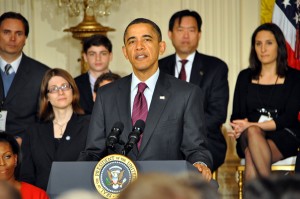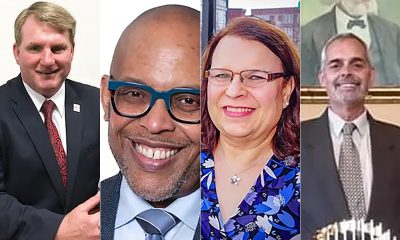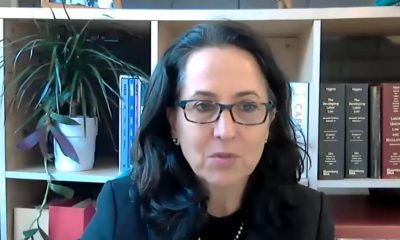National
Gay staffers take key roles in Obama campaign
From finance to digital initiatives, supporters working to win second term

[Editor’s note: This is the first of a two-part series.]
Engaging in tasks from fundraising to digital initiatives to public outreach, President Obama’s re-election campaign staff is already hard at work helping to secure a second term in the White House — and many members of the LGBT community have high-profile roles in that effort.
The Washington Blade interviewed four gay and lesbian staffers who are working to re-elect Obama from the campaign headquarters in Chicago. This article is the first in a two-part series and features interviews with two of the campaign workers: Rufus Gifford, the finance director, and Teddy Goff, the digital director.

President Obama’s campaign staff includes several high-profile gay members. (Blade file photo by Michael Key)
For Gifford, who’s gay, seeing Obama serve another two years in office is important because he believes the administration so far has been “two of the most productive years in American history.”
“I’ve been on board with the campaign in one way shape or form since January 2007 — nearly from the moment I met Sen. Obama,” Gifford said. “I was certainly a believer in him and his message and his politics, etc. So, I do believe that the last two years have been two of the very most productive years in American history. In my mind, truly, if we can get four more, think of how much more we can accomplish.”
Gifford said Obama’s accomplishments for the LGBT community — most notably “Don’t Ask, Don’t Tell” repeal — are “obviously very, very personally important” to him. Still, Gifford also counts among the president’s victories passage of the economic stimulus plan and health care reform as well as ratification of the START Treaty, a nuclear-arms reduction agreement.
As finance director, Gifford overseas the funds raised for both the Obama campaign as well as a joint committee that raises funds between the campaign and the Democratic National Committee. It’s similar to his role as finance director of the DNC, which he occupied immediately before joining the Obama campaign, and his role in raising money for Obama in California during the 2008 campaign.
“Every morning I start the day with a 9 a.m. senior staff meeting with the campaign leadership,” Gifford said. “I am a huge believer that finance should never be siloed within a campaign.”
Gifford said he believes the campaign will be stronger and raise more money if he’s talking to the directors of the field department, the digital department, the tech department and the communications department.
In the second quarter, fundraising for the Obama campaign beat expectations. Obama raised more than $86 million for his re-election campaign and the Democratic National Committee, which far outpaced Republican candidates seeking to oust him from the White House.
The third quarter numbers are yet to be made public. Media reports state that the campaign is expecting to rake in less cash because the president had to cancel fundraisers to attend debt ceiling negotiations with congressional leaders.
One difference that Gifford faces working with the Obama campaign in 2012 as opposed to his work in 2008 is the fact that he’s now separated from his partner, Jeremy Bernard, who serves as the White House social secretary.
In 2008, Gifford and Bernard were featured in numerous media outlets as a gay power couple and were named in Out magazine’s listing of the Top 50 power gays.
Gifford declined to comment on his separation from Bernard, but confirmed the couple split in 2009. Gifford’s current partner resides in D.C.
While Gifford manages fundraising for the Obama campaign, another gay member of the president’s re-election team, Goff, handles digital outreach efforts.
As digital director, Goff runs Internet communications for the campaign, which includes outreach via e-mail or social networking sites like Twitter and Facebook.
“Our job in the digital department is to talk to millions of Twitter followers, millions of e-mail subscribers, millions of Facebook fans everyday, and that’s a viewpoint that I think is helpful even in helping shape and inform broader discussions about how we talk to people and how we build,” Goff said.
Goff, who’s 26 and gay, comes to the Obama campaign after his most immediate position working with Blue State Digital, a digital agency in New York. In 2008, Goff ran digital programs at the state level for the Obama campaign.
Goff’s commitment to see Obama re-elected stems from the president’s record over the course of two-and-a-half years in office, which Goff said is “without parallel in my lifetime or even my parents’ lifetime.”
“So for me, he’s every bit as inspiring and compelling a figure as I ever thought he was.”
The main priority for 2011, Goff said, is making sure existing Obama supporters have avenues to make their voices heard.
What’s the best online platform for the Obama campaign to connect with its supporters? Goff said “everybody’s different” in the way they want to interact.
“There may be one person who wants to hear from us via e-mail, and another person who wants to hear from us on Twitter, but our point of view is that isn’t so much what matters,” Goff said. “Most things come and go. This time, four years ago, Myspace was a really big deal. Now people aren’t talking about that so much anymore. The perspective that we try to bring to it is what’s the basic content that’s going to engage people, how can we shape a relationship that’s going to make them feel engaged and feel like a part of the family.”
But the fight to re-elect Obama in 2012 could be more of a challenge than it was making sure he won the White House in 2008. Recent polls have placed Obama’s approval rating at its lowest point during the course of his term. A few weeks ago, Gallup found that Obama’s approval rating was at 39 percent, marking the first time his approval rating had dipped below 40 percent.
Gifford said he’s not in a position to say whether a win for Obama will be more challenging than it was in 2008, but asserted supporters will push on in the effort to claim victory.
Similarly, Goff said he doesn’t know if winning the White House will be more challenging for Obama in 2012, but said he expects the commitment of campaign workers would lead the president to victory.
The support that Obama will receive from the LGBT community in his re-election efforts remains to be seen. Significant milestones in LGBT rights occurred under his watch — most notably the passage of hate crimes legislation and repeal of “Don’t Ask, Don’t Tell.” Obama also received praise earlier this year for dropping the administration’s legal defense of the Defense of Marriage Act in court.
But other actions sought by the LGBT community remain outstanding — such as the enactment of employment protections based on sexual orientation and gender identity. The president’s lack of support for same-sex marriage riles some in the LGBT community as the fight to win marriage equality continues throughout the states.
Gifford said he’d tell anyone who says Obama hasn’t done enough on LGBT issues during his first term in office that “you cannot make the argument that this is not the most pro-gay administration in history.”
How can other LGBT people help who want to see Obama re-elected in 2012? Goff said those who are interested should check out the campaign website or participate in an on-the-ground field program that is being built in communities across the country.
“There are things for people who want to be involved only or primarily in LGBT issues,” Goff said. “We should have LGBT people do that, but also hope that LGBT people will get involved in the broad program and organize their community just like anybody else.”
State Department
State Department releases annual human rights report
Antony Blinken reiterates criticism of Uganda’s Anti-Homosexuality Act

Secretary of State Antony Blinken on Monday once again reiterated his criticism of Uganda’s Anti-Homosexuality Act upon release of the State Department’s annual human rights report.
“This year’s report also captures human rights abuses against members of vulnerable communities,” he told reporters. “In Afghanistan, the Taliban have limited work opportunities for women, shuttered institutions found educating girls, and increasing floggings for women and men accused of, quote, ‘immoral behavior,’ end quote. Uganda passed a draconian and discriminatory Anti-Homosexuality Act, threatening LGBTQI+ individuals with life imprisonment, even death, simply for being with the person they loved.”
Ugandan President Yoweri Museveni last May signed the law, which contains a death penalty provision for “aggravated homosexuality.”
The U.S. subsequently imposed visa restrictions on Ugandan officials and removed the country from a program that allows sub-Saharan African countries to trade duty-free with the U.S. The World Bank Group also announced the suspension of new loans to Uganda.
Uganda’s Constitutional Court earlier this month refused to “nullify the Anti-Homosexuality Act in its totality.” More than a dozen Ugandan LGBTQ activists have appealed the ruling.
Clare Byarugaba of Chapter Four Uganda, a Ugandan LGBTQ rights group, on Monday met with National Security Council Chief-of-Staff Curtis Ried. Jay Gilliam, the senior LGBTQI+ coordinator for the U.S. Agency for International Development, in February traveled to Uganda and met with LGBTQ activists who discussed the Anti-Homosexuality Act’s impact.
“LGBTQI+ activists reported police arrested numerous individuals on the basis of their sexual orientation or gender identity and subjected many to forced anal exams, a medically discredited practice with no evidentiary value that was considered a form of cruel, inhuman, and degrading treatment and could amount to torture,” reads the human rights report.
The report, among other things, also notes Ugandan human rights activists “reported numerous instances of state and non-state actor violence and harassment against LGBTQI+ persons and noted authorities did not adequately investigate the cases.”
Report highlights anti-LGBTQ crackdowns in Ghana, Hungary, Russia
Ghanaian lawmakers on Feb. 28 approved the Promotion of Proper Human Sexual Rights and Ghanaian Family Values Bill. The country’s president, Nana Akufo-Addo, has said he will not sign the measure until the Ghanaian Supreme Court rules on whether it is constitutional or not.
The human rights report notes “laws criminalizing consensual same-sex sexual conduct between adults” and “crimes involving violence or threats of violence targeting lesbian, gay, bisexual, transgender, queer or intersex persons” are among the “significant human rights issues” in Ghana.
The report documents Hungarian Prime Minister Viktor Orbán and members of his right-wing Fidesz party’s continued rhetoric against “gender ideology.” It also notes Russia’s ongoing crackdown against LGBTQ people that includes reports of “state actors committed violence against LGBTQI+ individuals based on their sexual orientation or gender identity, particularly in Chechnya.”
The report specifically notes Russian President Vladimir Putin on July 24 signed a law that bans “legal gender recognition, medical interventions aimed at changing the sex of a person, and gender-affirming care.” It also points out Papua New Guinea is among the countries in which consensual same-sex sexual relations remain criminalized.

The Cook Islands and Mauritius in decriminalized homosexuality in 2023.
The report notes the Namibia Supreme Court last May ruled the country must recognize same-sex marriages legally performed outside the country. The report also highlights the Indian Supreme Court’s ruling against marriage equality that it issued last October. (It later announced it would consider an appeal of the decision.)
Congress requires the State Department to release a human rights report each year.
The Biden-Harris administration in 2021 released a memorandum that committed the U.S. to promoting LGBTQ+ and intersex rights abroad.
The full report can be read here.
National
Same-sex couples vulnerable to adverse effects of climate change
Williams Institute report based on Census, federal agencies

A new report by the Williams Institute at the UCLA School of Law finds that same-sex couples are at greater risk of experiencing the adverse effects of climate change compared to different-sex couples.
LGBTQ people in same-sex couple households disproportionately live in coastal areas and cities and areas with poorer infrastructure and less access to resources, making them more vulnerable to climate hazards.
Using U.S. Census data and climate risk assessment data from NASA and the Federal Emergency Management Agency, researchers conducted a geographic analysis to assess the climate risk impacting same-sex couples. NASA’s risk assessment focuses on changes to meteorological patterns, infrastructure and built environment, and the presence of at-risk populations. FEMA’s assessment focuses on changes in the occurrence of severe weather events, accounting for at-risk populations, the availability of services, and access to resources.
Results show counties with a higher proportion of same-sex couples are, on average, at increased risk from environmental, infrastructure, and social vulnerabilities due to climate change.
“Given the disparate impact of climate change on LGBTQ populations, climate change policies, including disaster preparedness, response, and recovery plans, must address the specific needs and vulnerabilities facing LGBTQ people,” said study co-author Ari Shaw, senior fellow and director of international programs at the Williams Institute. “Policies should focus on mitigating discriminatory housing and urban development practices, making shelters safe spaces for LGBT people, and ensuring that relief aid reaches displaced LGBTQ individuals and families.”
“Factors underlying the geographic vulnerability are crucial to understanding why same-sex couples are threatened by climate change and whether the findings in our study apply to the broader LGBTQ population,” said study co-author Lindsay Mahowald, research data analyst at the Williams Institute. “More research is needed to examine how disparities in housing, employment, and health care among LGBT people compound the geographic vulnerabilities to climate change.”
Read the report
Federal Government
Lambda Legal praises Biden-Harris administration’s finalized Title IX regulations
New rules to take effect Aug. 1

The Biden-Harris administration’s revised Title IX policy “protects LGBTQ+ students from discrimination and other abuse,” Lambda Legal said in a statement praising the U.S. Department of Education’s issuance of the final rule on Friday.
Slated to take effect on Aug. 1, the new regulations constitute an expansion of the 1972 Title IX civil rights law, which prohibits sex-based discrimination in education programs that receive federal funding.
Pursuant to the U.S. Supreme Court’s ruling in the landmark 2020 Bostock v. Clayton County case, the department’s revised policy clarifies that discrimination on the basis of sexual orientation and gender identity constitutes sex-based discrimination as defined under the law.
“These regulations make it crystal clear that everyone can access schools that are safe, welcoming and that respect their rights,” Education Secretary Miguel Cardona said during a call with reporters on Thursday.
While the new rule does not provide guidance on whether schools must allow transgender students to play on sports teams corresponding with their gender identity to comply with Title IX, the question is addressed in a separate rule proposed by the agency in April.
The administration’s new policy also reverses some Trump-era Title IX rules governing how schools must respond to reports of sexual harassment and sexual assault, which were widely seen as imbalanced in favor of the accused.
Jennifer Klein, the director of the White House Gender Policy Council, said during Thursday’s call that the department sought to strike a balance with respect to these issues, “reaffirming our longstanding commitment to fundamental fairness.”
“We applaud the Biden administration’s action to rescind the legally unsound, cruel, and dangerous sexual harassment and assault rule of the previous administration,” Lambda Legal Nonbinary and Transgender Rights Project Director Sasha Buchert said in the group’s statement on Friday.
“Today’s rule instead appropriately underscores that Title IX’s civil rights protections clearly cover LGBTQ+ students, as well as survivors and pregnant and parenting students across race and gender identity,” she said. “Schools must be places where students can learn and thrive free of harassment, discrimination, and other abuse.”
-

 South America3 days ago
South America3 days agoDaniel Zamudio murderer’s parole request denied
-

 Maryland4 days ago
Maryland4 days agoMontgomery County police chief discusses arrest of trans student charged with planned school shooting
-

 Politics5 days ago
Politics5 days agoCourt records raise concerns about right-wing TikTok investor’s influence
-

 Commentary4 days ago
Commentary4 days agoWorld ‘isn’t much different today’












